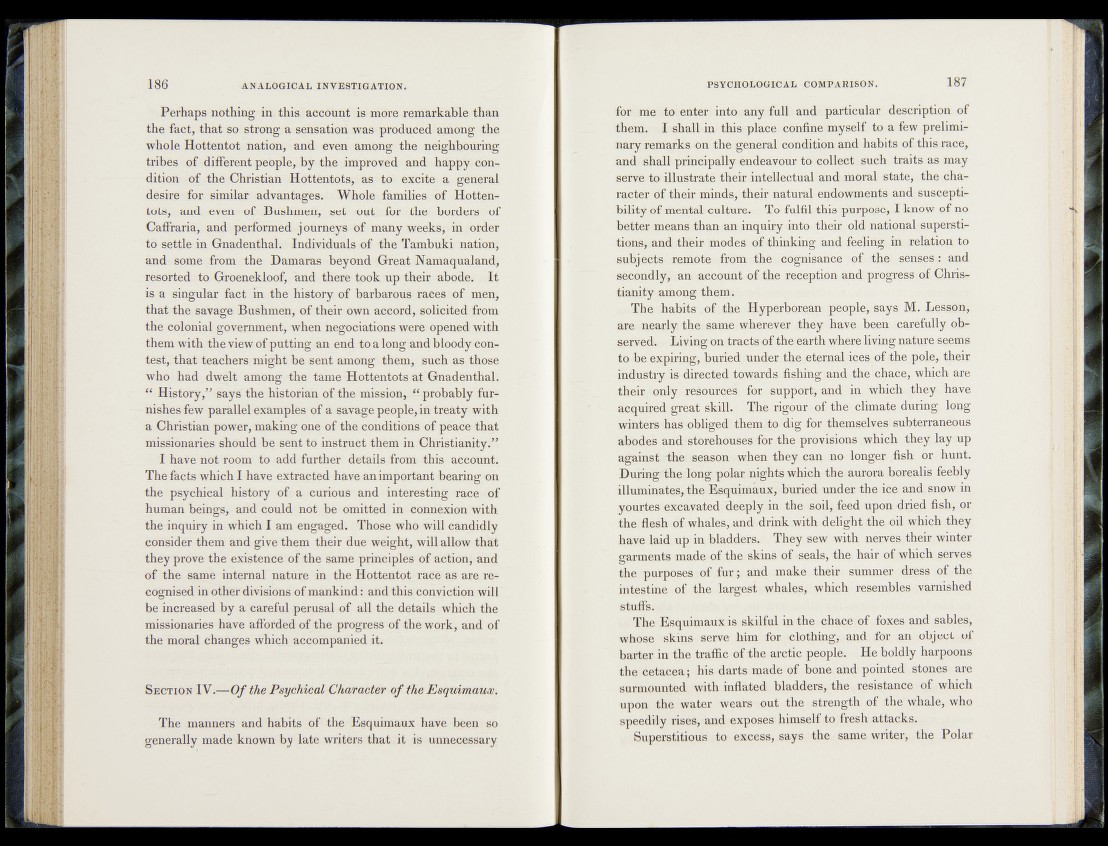
Perhaps nothing in this account is more remarkable than
the fact, that so strong a sensation was produced among the
whole Hottentot nation, and even among the neighbouring
tribes of different people, by the improved and happy-con-,
dition of the Christian Hottentots, as to excite a general
desire for similar advantages. Whole families of Hottentots,
and even of Bushmen, set out for the borders of
Caffraria, and performed journeys of many weeks, in order
to settle in Gnadenthal. Individuals of the Tambuki nation,
and some from the Damaras beyond Great Namaqualand,
resorted to Groenekloof, and there took up their abode. I t
is a singular fact in the history of barbarous races of men,
that the savage Bushmen, of their own accord, solicited from
the colonial government, when négociations were opened with
them with the view of putting an end Ho a long and bloody contest,
that teachers might be sent among them, such as those
who had dwelt among the tame Hottentots at Gnadenthal.
“ History,” says the historian of the mission^ - probably furnishes
few parallel examples of a savage people, in treaty with
a Christian power, making one of the conditions of peace that
missionaries should be sent to instruct them in Christianity.”
I have not room to add further details from this accounts
The facts which I have extracted have an important bearing bn
the psychical history of a curious and interesting race of
human beings, and could not be omitted in connexion with
the inquiry in which I am engaged. Those who will candidly
consider them and give them their due weight, will allow that
they prove the existence of the same principles of action, and
of the same internal nature in the Hottentot race as are recognised
in other divisions of mankind : and this conviction will
be increased by a careful perusal of all the details which the
missionaries have afforded of the progress of the work, and of
the moral changes which accompanied it.
S ection IV.— O f the Psychical Character o f the Esquimaux.
The manners and habits of the Esquimaux have been so
generally made known by late writers that it is unnecessary
for me to enter into any full and particular description of
them. I shall in this-place confine myself to a few preliminary
remarks on the general condition and habits of this race,
and shall principally endeavour to collect such traits as may
serve to illustrate their intellectual and moral state, the character
of their minds, their natural endowments and susceptibility
of mental culture. To fulfil this purpose, I know of no
better means than an inquiry into their old national superstitions,
and their modes of thinking and feeling in relation to
subjects remote from the cognisance of?;the- senses: and
secondly, an account of the reception and progress of Christianity
among them.
The habits ,of the Hyperborean people, says M. Lesson,
are nearly the same wherever they have been carefully observed.
Living on tracts of the earth where living nature, seems
to be expiring, buried under the eternal ices of the pele, their
industry is directed towards fishing and thebhape, v^hich are
their only resourced-for support; and in which they have
acquired great skill. The rigour- of theclimate during long
winters has obliged them to dig for themselves subterraneous
abodes and storehouses for the provisions which they lay up
against the season when they can no longer .fish or hunt.
During the long polar nights which the-aurora borealis feebly
illuminates, the Esquimaux, buried under the ice and snow in
yourtes excavated deeply in the soil, feed upon dried fish,, or
the flesh of whales, and drink with delight the oil which they
have laid up in bladders. They sew with nerves their winter
garments made of the skins of seals, the hair ofwhichserves
the purposes of fur; and make their summer dress of the
intestine of the largest whales, which resembles varnished
stuffs.
The Esquimaux is skilful in the chace of foxes and sables,
whose skins serve him for clothing, and for an object of
barter in the traffic of the arctic people. He holdly harpoons
the cetacea; his darts made of bone and pointed stones are
surmounted with inflated bladders, the resistance of which
upon the water wears out the strength of the whale, who
speedily rises, and exposes himself to fresh attacks.
Superstitious to excess, says the same writer, the Polar